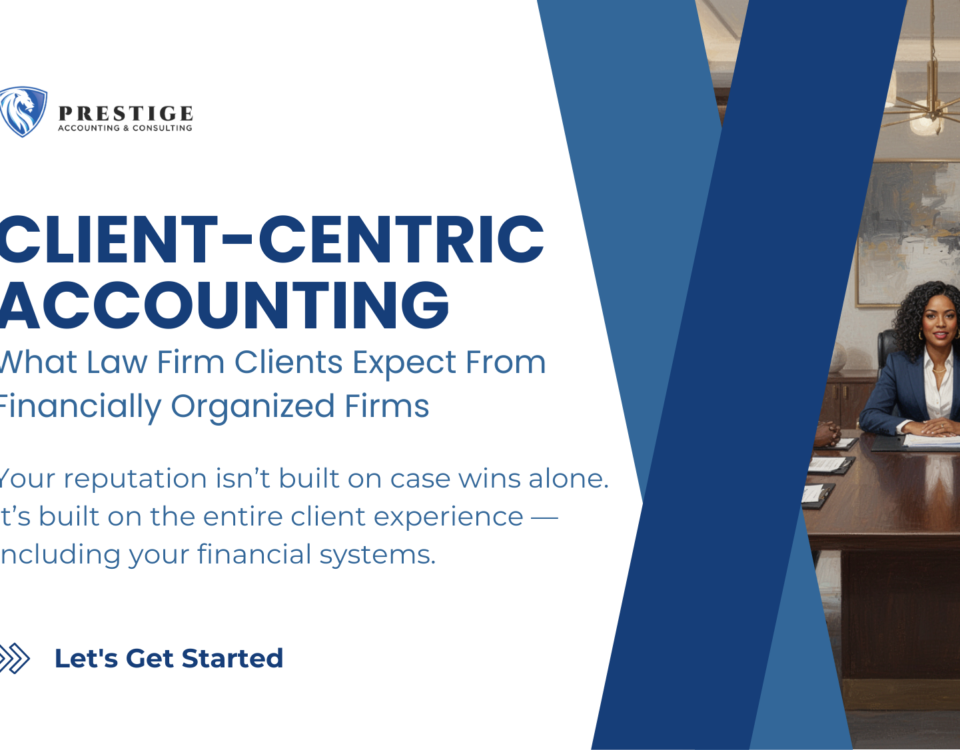
How to Forecast Profit and Distributions for the Rest of the Year
July 15, 2025
When to Stop DIYing Your Law Firm’s Finances
July 22, 2025
Categories
Tags
- 1099 Contractor Deductions
- Attorney Tax Strategy
- CPA for lawyers
- Home Office Deduction for Lawyers
- Law Firm Accounting
- Law Firm Tax Deductions
- Legal Bookkeeping Tips
- Legal Business Tax Tips
- Legal Expense Tracking
- Marketing Write-Offs
- Missed Deductions for Lawyers
- Q4 Tax Planning
- Small Firm Tax Strategy
- Year-End Tax Planning
Top 5 Tax Deductions Law Firms Miss Before Year-End
How to Stop Leaving Thousands on the Table Before December 31
Every January, lawyers call us saying the same thing:
“I had no idea I could’ve deducted that.”
And every January, it’s too late.
Year-end tax strategy isn’t just about what you made—it’s about what you missed. And what most law firm owners miss are the deductions that aren’t obvious… the ones that don’t live neatly on your bank statement or don’t show up because you’re too busy managing cases to think like a CFO.
If your firm has grown this year, added team members, started operating remotely, or made investments in marketing or operations—there’s a good chance you’re not fully capturing all your legal, legitimate, and completely IRS-approved deductions.
Let’s fix that.
The Hidden Deductions Hiding in Plain Sight
No, we’re not talking about printer paper or bar dues.
We’re talking about the deductions that could move your tax liability—but only if you document them correctly and claim them before December 31.
For example, do you pay your assistant with a Venmo transfer every month? If it’s not on the books and a W-9 wasn’t collected, that’s not a deduction—it’s just a payment.
Did you buy a laptop for your paralegal but use your personal credit card? You’ll need to code that expense correctly, or it won’t get deducted.
The IRS doesn’t reward effort—it rewards structure.
That means many solo and small firm lawyers do spend the money, but they don’t track it properly, don’t categorize it, and don’t have systems that catch what’s missing.
And that’s where the savings disappear.
What Growing Law Firms Often Overlook
As your firm scales, you start spending differently. But if your accounting stays basic, you miss out.
Here’s what we’ve seen repeatedly:
- Home office deductions go unclaimed because no one calculated square footage or tracked utility use.
- Marketing investments aren’t documented as business development, especially if they were paid via personal accounts.
- Professional development—like online business coaching, firm retreats, or mastermind events—gets ignored if it wasn’t labeled as CLE.
- Technology upgrades (software, hardware, digital tools) often get recorded as assets when they could be expensed or depreciated more favorably.
- Contractor payments are forgotten if no 1099 process is in place—so you lose the deduction and risk compliance penalties.
These aren’t loopholes. These are legitimate, missed opportunities.
The Real Cost of “I’ll Just Deal With It at Tax Time”
Waiting until tax season to sort this out is like waiting until trial to read your client’s file.
You’ll be rushed. You’ll be frustrated. And you’ll almost certainly miss something important.
When your bookkeeping is clean and categorized by Q3, your CPA can proactively:
- Adjust your estimated payments (so you don’t overpay)
- Identify safe deductions before year-end closes
- Recommend purchases or contributions that reduce taxable income
And you, as the business owner, get to make smart decisions while you still have time to act.
So, What Should You Do Right Now?
No list of deductions will help if your books are a mess, your credit card is personal, and your software doesn’t separate trust from operating expenses.
That’s why the next move isn’t downloading a checklist, it’s talking to someone who knows exactly what applies to your practice.
 Let’s Get You Caught Up, Cleaned Up, and Written Off (the Right Way)
Let’s Get You Caught Up, Cleaned Up, and Written Off (the Right Way)
At Prestige Accounting and Consulting, we work exclusively with law firm owners.
We know the real deductions, the compliance guardrails, and the strategies that save you money without raising red flags.
Before year-end closes, we’ll help you:
- Identify deductions you’re missing right now
- Clean up your financials to document them properly
- Reduce your taxable income without spending recklessly
Let’s find what your books are hiding—and keep more of your money working for you.





